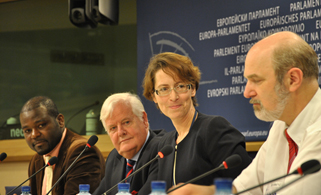Last March, we witnessed a horrendous terrorist attack in Kenya targeting Christians. Terrorist organisation Al-Shabaab launched a hit against Garissa University that resulted in the killing of 150 people, among which many evangelical Christians. This terrible event was discussed, along with the recent wave of violent attacks and crimes in the name of religion, during the last plenary session of the European Parliament in Strasbourg. All Members of the European Parliament (MEPs) were unanimous in condemning the recent attack against students in Kenya by Al-Shabaab. Representing the European Commission, Commissioner for International Cooperation Neven Mimica underlined the right of people all over the world to worship freely without fear of attacks, stressing that respect of Human Rights remains an important element in EU’s external relations.
After a lively debate, MEPs adopted a resolution which reiterates that religious freedom “is a fundamental right and strongly condemns any violence or discrimination on the basis of religion,” condemns the attack, and underlines the importance of the protection of fundamental Human Rights within the framework of EU External Relations and anti-terrorism strategy. The final adopted document made no explicit reference to ‘the persecution of Christians,’ adopting a more inclusive language although drafts that were proposed followed a different line. Nevertheless, the EEA believes that the adoption of this resolution is a positive development. We have always maintained a “principled approach” to Freedom of Religion or Belief (FoRB), viewing it as a universal right based on the concept of protection of human dignity; a fundamental right that concerns all people regardless of their religious or philosophical beliefs. We therefore do not perceive the persecution of Christians to be an element of a “Clash of Civilisations,” a recurring theme among European extremist parties, although Christians are clearly targeted by religious hatred and persecution in the world and victims, similarly to other groups, of intolerance and discrimination in Europe . So, we believe that it is vital to put pressure on the European Institutions to regard the protection of Fundamental Rights like FoRB as a priority in conducting EU’s external relations.
Watch the video of the debate here.
Access the text of the European Parliament resolution here. (also available in all official languages of the European Union).
For the first time, the European Parliament’s resolution recommends viewing the protection of FoRB as a key element of anti-terrorism strategy. This is part of a rising trend in European political circles where a lot of emphasis is placed on prevention and de-radicalisation as key anti-terrorism measures. In a sense, the view is now that promoting and protecting FoRB for all as well as strong, pluralistic civic education, are important means of deterring violent extremism. There is a lot of resonance here with what the EEA’s been promoting since 2012 when the Global Charter of Conscience was launched.
Although this resolution in itself creates no obligation for the EU, the Parliament will influence the European External Action Service (the EU’s branch for foreign affairs) with hopes that the EEAS will espouse its views. In particular, the newly-formed official European Parliament Intergoup on FoRB will see to it that the Parliament’s resolution is followed up in practice.
Leftéris Kaloterákis
Christel Lamère Ngnambi






